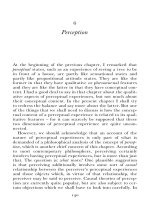Introduction of An Introduction to the Philosophy of Mind
Bạn đang xem bản rút gọn của tài liệu. Xem và tải ngay bản đầy đủ của tài liệu tại đây (56.21 KB, 7 trang )
1
Introduction
What is the philosophy of mind? One might be tempted to answer
that it is the study of philosophical questions concerning the
mind and its properties – questions such as whether the mind
is distinct from the body or some part of it, such as the brain,
and whether the mind has properties, such as consciousness,
which are unique to it. But such an answer implicitly assumes
something which is already philosophically contentious,
namely, that ‘minds’ are objects of a certain kind, somehow
related – perhaps causally, perhaps by identity – to other
objects, such as bodies or brains. In short, such an answer
involves an implicit reification of minds: literally, a making of
them into ‘things’. Indo-European languages such as English
are overburdened with nouns and those whose native tongues
they are have an unwarranted tendency to suppose that
nouns name things. When we speak of people having both
minds and bodies, it would be naı
¨
ve to construe this as akin
to saying that trees have both leaves and trunks. Human
bodies are certainly ‘things’ of a certain kind. But when we
say that people ‘have minds’ we are, surely, saying something
about the properties of people rather than about certain
‘things’ which people somehow own. A more circumspect way
of saying that people ‘have minds’ would be to say that people
are minded or mindful, meaning thereby just that they feel,
see, think, reason and so forth. According to this view of the
matter, the philosophy of mind is the philosophical study of
minded things just insofar as they are minded. The things
in question will include people, but may well also include
non-human animals and perhaps even robots, if these too can
1
An introduction to the philosophy of mind2
be minded. More speculatively, the things in question might
even include disembodied spirits, such as angels and God, if
such things do or could exist.
Is there some single general term which embraces all
minded things, actual and possible? Not, I think, in everyday
language, but we can suggest one. My suggestion is that we
use the term ‘subject’ for this purpose. There is a slight
inconvenience attached to this, inasmuch as the word ‘sub-
ject’ also has other uses, for instance as a synonym for ‘topic’.
But in practice no confusion is likely to arise on this account.
And, in any case, any possible ambiguity can easily be
removed by expanding ‘subject’ in our intended sense to ‘sub-
ject of experience’ – understanding ‘experience’ here in a broad
sense to embrace any kind of sensation, perception or
thought. This agreed, we can say that the philosophy of mind
is the philosophical study of subjects of experience – what
they are, how they can exist, and how they are related to the
rest of creation.
1
EMPIRICAL PSYCHOLOGY AND PHILOSOPHICAL ANALYSIS
But what is distinctive about the philosophical study of subjects
of experience? How, for instance, does it differ from the sort
of study of them conducted by empirical psychologists? It dif-
fers in several ways. For one thing, the philosophy of mind
pays close attention to the concepts we deploy in characterising
things as being subjects of experience. Thus it is concerned
with the analysis of such concepts as the concepts of percep-
tion, thought and intentional agency. The philosophical ana-
lysis of a concept is not to be confused with a mere account
of the meaning of a word as it is used by some speech com-
munity, whether this community be the population at large
or a group of scientists. For example, an adequate analysis
of the concept of seeing cannot be arrived at simply by examin-
1
I say more about the notion of a ‘subject of experience’ in my book of that title,
Subjects of Experience (Cambridge: Cambridge University Press, 1996): see espe-
cially chs. 1 and 2.
Introduction 3
ing how either ordinary people or empirical psychologists use
the word ‘see’. Of course, we cannot completely ignore every-
day usage in trying to analyse such a concept, but we must
be ready to criticise and refine that usage where it is confused
or vague. The philosophical study of any subject matter is
above all a critical and reflective exercise which – the opinion
of Wittgenstein notwithstanding – almost always will not and
should not leave our use of words unaltered.
2
No doubt it is true that good empirical psychologists are
critical and reflective about their use of psychological words:
but that is just to say that they too can be philosophical about
their discipline. Philosophy is not an exclusive club to which
only fully paid-up members can belong. Even so, there is such
a thing as expertise in philosophical thinking, which takes
some pains to achieve, and very often the practitioners of
the various sciences have not had the time or opportunity to
acquire it. Hence it is not, in general, a good thing to leave
philosophising about the subject matter of a given science
exclusively to its own practitioners. At the same time, how-
ever, it is incumbent upon trained philosophers to inform
themselves as well as they can about a domain of empirical
scientific inquiry before presuming to offer philosophical
reflections about it. A scientific theory of vision, say, is nei-
ther a rival to nor a substitute for a philosophical analysis of
the concept of seeing: but each will have more credibility to
the extent that it is consistent with the other.
METAPHYSICS AND THE PHILOSOPHY OF MIND
The philosophy of mind is not only concerned with the philo-
sophical analysis of mental or psychological concepts, how-
2
It is in the Philosophical Investigations, trans. G. E. M. Anscombe, 2nd edn (Oxford:
Blackwell, 1958), § 124, that Ludwig Wittgenstein famously says that ‘Philosophy
may in no way interfere with the actual use of language . . . [i]t leaves everything
as it is’. As will be gathered, I strongly disagree with this doctrine, which has, in
my view, had a malign influence on the philosophy of mind. At the same time, I
readily concede that Wittgenstein himself has contributed much of value to our
understanding of ourselves as subjects of experience.
An introduction to the philosophy of mind4
ever. It is also inextricably involved with metaphysical issues.
Metaphysics – which has traditionally been held to be the
root of all philosophy – is the systematic investigation of the
most fundamental structure of reality. It includes, as an
important sub-division, ontology: the study of what general
categories of things do or could exist. The philosophy of mind
is involved with metaphysics because it has to say something
about the ontological status of subjects of experience and
their place within the wider scheme of things. No special
science – not even physics, much less psychology – can usurp
the role of metaphysics, because every empirical science pre-
supposes a metaphysical framework in which to interpret its
experimental findings. Without a coherent general concep-
tion of the whole of reality, we cannot hope to render compat-
ible the theories and observations of the various different
sciences: and providing that conception is not the task of any
one of those sciences, but rather that of metaphysics.
Some people believe that the age of metaphysics is past
and that what metaphysicians aspire to achieve is an imposs-
ible dream. They claim that it is an illusion to suppose that
human beings can formulate and justify an undistorted pic-
ture of the fundamental structure of reality – either because
reality is inaccessible to us or else because it is a myth to
suppose that a reality independent of our beliefs exists at all.
To these sceptics I reply that the pursuit of metaphysics is
inescapable for any rational being and that they themselves
demonstrate this in the objections which they raise against
it. For to say that reality is inaccessible to us or that there is
no reality independent of our beliefs is just to make a meta-
physical claim. And if they reply by admitting this while at
the same time denying that they or any one else can justify
metaphysical claims by reasoned argument, then my
response is twofold. First, unless they can give me some reason
for thinking that metaphysical claims are never justifiable, I
do not see why I should accept what they say about this.
Secondly, if they mean to abandon reasoned argument alto-
gether, even in defence of their own position, then I have
Introduction 5
nothing more to say to them because they have excluded
themselves from further debate.
Metaphysics is unavoidable for a rational thinker, but this
is not to say that metaphysical thought and reasoning are
either easy or infallible. Absolute certainty is no more attain-
able in metaphysics than it is in any other field of rational
inquiry and it is unfair to criticise metaphysics for failing to
deliver what no other discipline – not even mathematics – is
expected to deliver. Nor is good metaphysics conducted in
isolation from empirical inquiries. If we want to know about
the fundamental structure of reality, we cannot afford to
ignore what empirically well-informed scientists tell us about
what, in their opinion, there is in the world. However, science
only aims to establish what does in fact exist, given the empir-
ical evidence available to us. It does not and cannot purport
to tell us what could or could not exist, much less what must
exist, for these are matters which go beyond the scope of any
empirical evidence. Yet science itself can only use empirical
evidence to establish what does in fact exist in the light of a
coherent conception of what could or could not exist, because
empirical evidence can only be evidence for the existence of
things whose existence is at least genuinely possible. And the
provision of just such a conception is one of the principal
tasks of metaphysics.
3
The point of these remarks is to emphasise there cannot
be progress either in the philosophy of mind or in empirical
psychology if metaphysics is ignored or abandoned. The
methods and findings of empirical psychologists and other
scientists, valuable though they are, are no substitute for
metaphysics in the philosopher of mind’s investigations. Nor
should our metaphysics be slavishly subservient to prevailing
scientific fashion. Scientists inevitably have their own meta-
physical beliefs, often unspoken and unreflective ones, but it
3
I explain more fully my views about metaphysics and its importance in my The
Possibility of Metaphysics: Substance, Identity and Time (Oxford: Clarendon Press,
1998), ch. 1.









